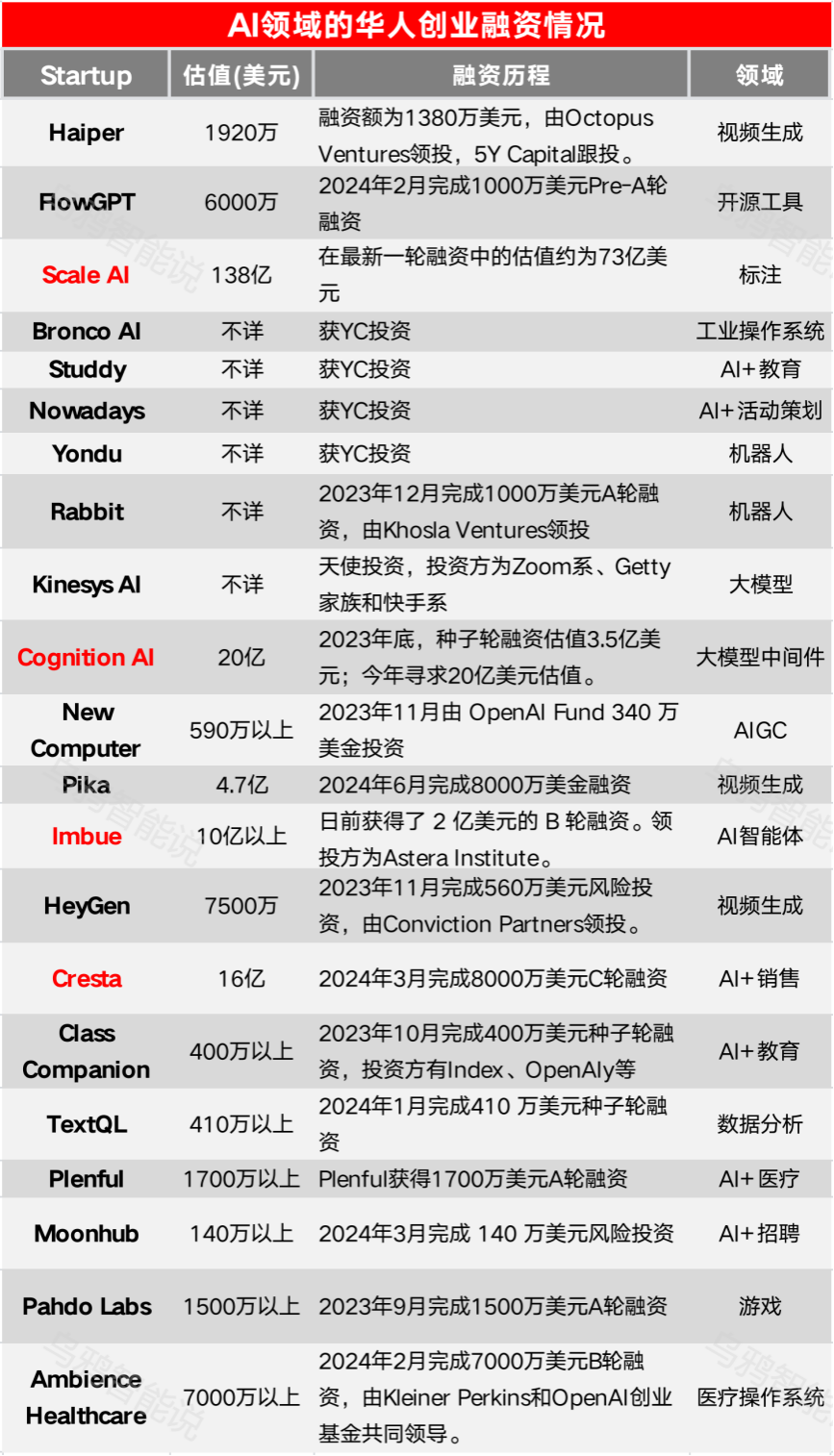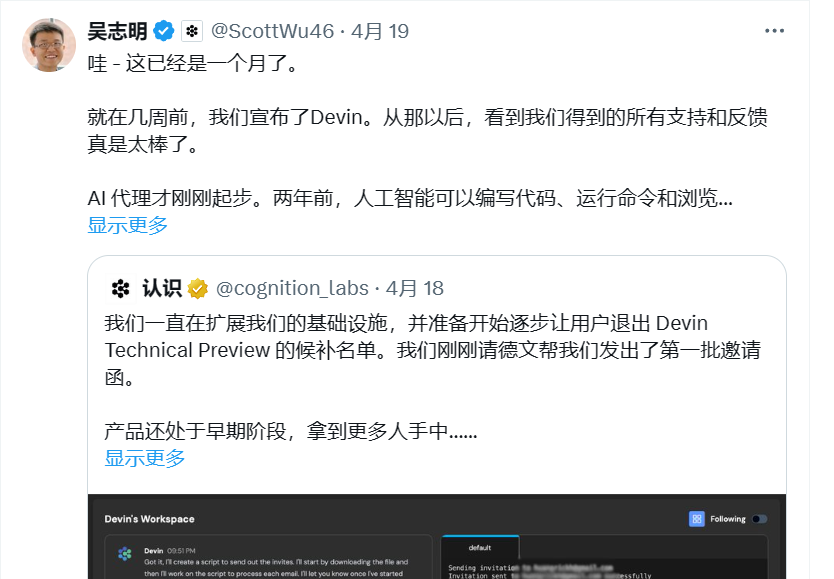Post-95 Chinese individuals are整顿ing the AI circle! Startups with a valuation exceeding 130 billion, producing 4 unicorns
![]() 06/14 2024
06/14 2024
![]() 524
524
Beijing has been experiencing thunderstorms these days, while on the other side of the globe, California, where the Apple WWDC conference has just concluded, has been bathed in sunshine, with waves of AI surging, among which Chinese figures frequently emerge.
The American think tank MacroPolo released the "Global AI Talent Tracking Survey Report" in April, pointing out that the top AI talent in the United States is mainly Chinese, accounting for up to 75%, and the proportion is still increasing. The fact that there are a large number of Chinese people in the AI industry also proves the importance of Chinese talent. There are many outstanding Chinese individuals holding important positions in top AI companies such as OpenAI, Microsoft, Meta, Amazon, and more.
Wuya Jun has rounded up over 20 highly anticipated Chinese AI startups and 30+ Chinese entrepreneurs, with a total valuation of approximately 19.14 billion US dollars (about 138.8 billion yuan)! Among them, 4 unicorns have emerged, and half of the entrepreneurs are post-95s.
At the same time, stories such as "MIT Chinese female scientist raises $200 million in funding," "19-year-old dropout founds AI unicorn," and "Beautiful heiress bravely enters the AI video generation circle" have shown us the vast possibilities of AI.
The AI table is already set, and various forces are placing their bets. From academics to seasoned entrepreneurs, will Chinese entrepreneurs plow forward or take the fast lane?

▲An overview of Chinese entrepreneurs in the AI field, with red marks for unicorn companies, pink marks for female entrepreneurs, and green marks for post-95 entrepreneurs (Source: Wuya Intelligence)
/ 01 / Crazy funding and valuations, crowding into the video generation field
In terms of entrepreneurial directions, Chinese individuals have ventured into a wide range of areas, from algorithmic innovations at the model layer (Imbue, Pika, HeyGen, Rabbit, etc.) to various vertical industry solutions at the application layer (Class Companion, TextQL, Plenful, Moonhub, Pahdo Labs, Ambience Healthcare, etc.), demonstrating the widespread influence of Chinese individuals in various AI fields.
Among the many AI tracks, video generation is an area in which Chinese individuals have particularly high participation. Just in March of this year, three AI video generation startups founded by Chinese individuals (Haiper, Aishi Technology, HeyGen) received funding in clusters, and the funding amounts all exceeded 10 million US dollars.

▲Financing situation of Chinese entrepreneurial projects in the AI field, with red marks for unicorn companies (Source: Wuya Intelligence)
1. Total valuation reaches 19.14 billion, producing 4 unicorns
The total valuation of Chinese AI startups has reached 19.14 billion US dollars (about 138.8 billion yuan), and four unicorns have emerged: Scale AI, Cognition AI, Imbue, and Cresta. Founded in 2016, Scale AI has a valuation of 13.8 billion US dollars, while other younger unicorn companies have valuations between 1 and 2 billion US dollars.
CognitionAI, an AI startup, saw its AI programmer Devin raise 2 billion US dollars in funding within weeks of its launch, and the valuation of its parent company has increased sixfold to 2 billion US dollars within half a year. The company boasts a team of top Chinese programmers: CEO Scott Wu, CTO Steven Hao, and CPO Walden Yan.

Imbue, founded by a Chinese female scientist, received funding from NVIDIA in the third quarter of last year. This startup has only 20 employees and has not released any products to the public, but it has gained the support of an investment team composed of industry leaders by investing in the AI agent field, which is highly regarded by many AI experts.
The speed at which these AI startups have emerged is also astonishing. Cresta, which is based on generative AI service sales, took only two years from its official launch in 2020 to become a technology unicorn, making it one of the fastest-growing AI companies in the world.
AI track funding and valuations are crazy, but signs of a cooling trend are emerging, and financing miracles may be difficult to replicate. The research institute CB Insights' "2023 AI Industry Status Report" shows that the total funding for global AI startups in 2023 declined by 10%, with the number of funding deals hitting an industry low since 2017.
2. Recreating Sora? A big explosion in video generation, with vertical AI heating up
Video generation is undoubtedly the area where Chinese entrepreneurs have achieved the best results. Sora immediately made a splash in the global AI field with the release of just a few videos, igniting heated discussions in the technology community about large video models. In the field of text-to-video large models, it's not just Sora from OpenAI that stands out. Chinese startups Pika, HeyGen, and Haiper are also competing fiercely in this track.
Since the launch of its AI video creation application last year, HeyGen has achieved significant revenue growth, with annual recurring revenue (ARR) reaching 18 million US dollars. Recently, HeyGen received a 5.6 million US dollar venture capital investment led by Conviction Partners, with a valuation of 75 million US dollars.
Among AI video products, Pika has the highest financing amount. Recently, Pika returned with a new round of 80 million US dollar financing, with investors including renowned institutions such as Spark Capital (lead investor), Lightspeed, and Greycroft. Pika responded to Quantum Bit that the latest post-investment valuation will reach 470 million US dollars.
In addition to video generation, Chinese entrepreneurs also have a strong preference for vertical AI, applying AI to existing products and using AI to improve the performance, competitiveness, and customer satisfaction of existing technologies or projects. For example, YC invested in the event planning company Nowadays this year, the unicorn AI education enterprise Cresta, and the AI medical enterprise Plenful.
For these exciting tracks, Chinese startups also face challenges such as product technical defects and instability. A typical example is Rabbit, a company with a complex entrepreneurial history. The company quickly sold over 100,000 units of its small AI smart devices during the pre-sale in January, but was later "exposed" by iFixit and Engadget, who believed that it "does not have an internal structure for running AI computations" after dismantling and reviewing the product.
/ 02 / All from MIT, Stanford, etc., with post-95 entrepreneurs accounting for half
1. MIT becomes a Chinese entrepreneurial factory, with advantages in computer science and AI
Almost all Chinese entrepreneurs have educational backgrounds from world-renowned universities such as the Massachusetts Institute of Technology (MIT), Stanford University, the University of California, Berkeley, Harvard University, and more. Among them, MIT graduates account for the highest proportion, with the founders of Nowadays, Yondu, Imbue, and Ambience Healthcare all hailing from MIT. This basically aligns with the data from the well-known startup database Crunchbase, which found that during the 2022-2023 period, Stanford University, MIT, and the University of California, Berkeley ranked among the top three for American startup founders who raised over 1 million US dollars in funding.
Computer science, artificial intelligence, and electronic engineering are areas where Chinese individuals have an advantage. In terms of work experience, many have held key technical or management positions at globally renowned technology companies such as Google, Microsoft, IBM, and more, accumulating rich industry experience and network resources.
It is worth noting that "dropping out of prestigious universities" has become a classic script for becoming an AI leader. Stanford female doctoral student Guo Wenjing, who was dissatisfied with the AI tools of Runway and Adobe Photoshop when participating in an AI film festival, dropped out of school last April to found Pika. Similarly, Sam Altman, a key figure at OpenAI, also dropped out of Stanford to start a business.
Some established entrepreneurs also have complaints about prestigious university courses. For example, Ethan Ding, the founder and CEO of TextQL, wrote in a leadership article that he graduated from the College of Engineering at the University of California, Berkeley, but this period of study "didn't really learn anything useful," which is quite humorous.
2. Younger teams, with interests driving post-95/00 entrepreneurs to take the lead
Compared to整顿ing the workplace, becoming an AI leader is even more exciting. Post-95 Chinese individuals are forming their own "AI dream team." Among the Chinese startup founders in the AI circle, half are post-95s, such as Cognition AI, Pahdo Labs, New Computer, and even FlowGPT and Kinesys AI are founded by post-00s.
The process of Dang Jiacheng, a 21-year-old, founding the world's largest FlowGPT fully demonstrates that "entrepreneurship in the product category does not require a lot of experience at all." From "0" to product launch, Dang Jiacheng only spent three days. Kinesys AI founder and CEO Nemo Yang went to Silicon Valley alone at the age of 14 because he loved computers. Later, he obtained a bachelor's and master's degree from the Georgia Institute of Technology in just two years. After graduation, he developed Cortex, a middleware for large models that AI developers need the most, which is also the reason why they gained the favor of capital.
These young Chinese individuals already have profound insights and research in AI during their school years, and are able to keenly sense AI trends and criticize and reflect on existing technologies.
3. Female entrepreneurship accounts for 20%, transforming lives with "hot and spicy" enthusiasm
Among the 21 Chinese AI companies, 4 are founded by women, accounting for nearly 20%, and 6 of the 30+ Chinese entrepreneurs are women. In addition to the unicorn Pika, Plenful, and Class Companion mentioned above, Imbue, Nowadays, and Moonhub are also founded by women.
Qiu Kanjun (Kanjun Qiu), the founder and CEO of Imbue, focuses on "people," "culture," and social organizations, aiming to achieve general intelligence by understanding the way machines think. During the financing process, they intentionally avoided meetings with venture capital firms, believing that non-profit organizations would be more patient with the company's growth. Nowadays is a sisterhood startup, with founders Anna Sun and Amy Yan dedicated to creating an AI-driven event planning assistant that can automatically contact venues, manage negotiations, and control budgets.
Whether it's Pika CEO Guo Wenjing, Imbue CEO Qiu Kanjun, or Nowadays' Anna Sun and Amy Yan, these female entrepreneurs exhibit a "light" psychological burden, reflecting a different quality of "being fearless because of passion."
/ 03 / Conclusion
In addition to their solid basic qualities, Chinese individuals have their own understanding of tracks such as video, vertical AI, and AI infrastructure, bringing strong vitality to the popularization and commercialization of global AI applications. We look forward to seeing how these knowledgeable, young, and wealthy Chinese founders will continue to break through technological bottlenecks, injecting continuous innovative momentum into the development of large model infrastructure, AIGC generation, and vertical industry AI fields.









